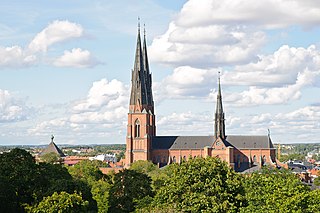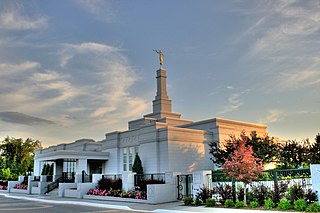Religious conversion is the adoption of a set of beliefs identified with one particular religious denomination to the exclusion of others. Thus "religious conversion" would describe the abandoning of adherence to one denomination and affiliating with another. This might be from one to another denomination within the same religion, for example, from Protestant Christianity to Roman Catholicism or from Sunnī Islam to Shīʿa Islam. In some cases, religious conversion "marks a transformation of religious identity and is symbolized by special rituals".
Universalism is the philosophical and theological concept that some ideas have universal application or applicability.
Many Wikipedia articles on religious topics are not yet listed on this page. If you cannot find the topic you are interested in on this page, it still may already exist; you can try to find it using the "Search" box. If you find that it exists, you can edit this page to add a link to it.

Christianity is the predominant religion in the Philippines, with Roman Catholicism being its largest denomination. Sizeable Muslim and non-religious minorities are also present.
Most Americans consider themselves religious or spiritual in some way, while Christianity is the most widely professed religion in the United States, with Protestantism being the most common form of Christianity in the country. According to Gallup, 58% and 17% report praying often or sometimes, respectively, and 46% and 26% report that religion plays a very important or fairly important role, respectively, in their lives. However, the majority of Americans do not regularly attend religious services and have low confidence in religious institutions, with the country rapidly secularizing since the 1990s. According to the 2017 World Values Survey, the U.S. is more secular than the median country. A large variety of faiths have historically flourished within the country.

A variety of religious emblems programs are used by the Boy Scouts of America (BSA) to encourage youth to learn about their faith and to recognize adults who provide significant service to youth in a religious environment. These religious programs are created, administered and awarded by the various religious groups, not the BSA, but each program must be recognized by the BSA.
Religion in Singapore is characterised by a wide variety of religious beliefs and practices due to its diverse ethnic mix of peoples originating from various parts of the world. A secular state, Singapore is commonly termed as a "melting pot" of various religious practices originating from different religious denominations around the world. Most major religious denominations are present in the country, with the Inter-Religious Organisation, Singapore (IRO) recognising 10 major religions. A 2014 analysis by the Pew Research Center found Singapore to be the world's most religiously diverse nation.
Anarchists have traditionally been skeptical of or vehemently opposed to organized religion. Nevertheless, some anarchists have provided religious interpretations and approaches to anarchism, including the idea that the glorification of the state is a form of sinful idolatry.
Religious socialism is a type of socialism based on religious values. Members of several major religions have found that their beliefs about human society fit with socialist principles and ideas. As a result, religious socialist movements have developed within these religions. Those movements include Buddhist socialism, Christian socialism, Islamic socialism, and Jewish socialism. According to the Encyclopedia Britannica Online, socialism is a "social and economic doctrine that calls for public rather than private ownership or control of property and natural resources. According to the socialist view, individuals do not live or work in isolation but live in cooperation with one another. Furthermore, everything that people produce is in some sense a social product, and everyone who contributes to the production of a good is entitled to a share in it. Society as a whole, therefore, should own or at least control property for the benefit of all its members. [...] Early Christian communities also practiced the sharing of goods and labour, a simple form of socialism subsequently followed in certain forms of monasticism. Several monastic orders continue these practices today".

Religion in Europe has been a major influence on today's society, art, culture, philosophy and law. The largest religion in Europe is Christianity, but irreligion and practical secularisation are strong. Three countries in Southeastern Europe have Muslim majorities. Ancient European religions included veneration for deities such as Zeus. Modern revival movements of these religions include Heathenism, Rodnovery, Romuva, Druidry, Wicca, and others. Smaller religions include Indian religions, Judaism, and some East Asian religions, which are found in their largest groups in Britain, France, and Kalmykia.

The official religion of Pakistan is Islam, as enshrined by Article 2 of the Constitution, and is practised by approximately 96.47% of the country's population. The remaining 3.53% practice Hinduism, Christianity, Ahmadiyya Islam, Sikhism and other religions.
Religious emblems programs also called religious recognition programs are awards set up by some religious organizations for members of various youth organizations.

The Catholic branch of Christianity is the dominant religion in Mexico, representing 78% of the total population as of 2020. In recent decades the share of Catholics has been declining, due to the growth of other Christian denominations – especially various Protestant churches, Jehovah's Witness and Mormonism – which now constitute 9.7% of the population, and non-Christian religions. Conversion to non-Catholic denominations has been considerably lower than in Central America, and central Mexico remains one of the most Catholic areas in the world.
Some movements or sects within traditionally monotheistic or polytheistic religions recognize that it is possible to practice religious faith, spirituality and adherence to tenets without a belief in deities. People with what would be considered religious or spiritual belief in a supernatural controlling power are defined by some as adherents to a religion; the argument that atheism is a religion has been described as a contradiction in terms.

Religion in Scouting and Guiding is an aspect of the Scout method that has been practiced differently and given different interpretations in different parts of the world over the years.

Religion in Sweden has, over the years, become increasingly diverse. Christianity was the religion of virtually all of the Swedish population from the 12th to the early 20th century, but it has rapidly declined throughout the late 20th and early 21st century.

Religion in Edmonton consists of the diverse religious traditions of the people who live in Edmonton, the capital of Alberta.







